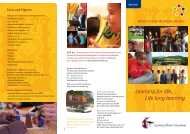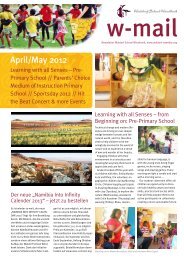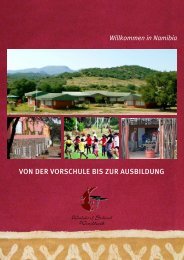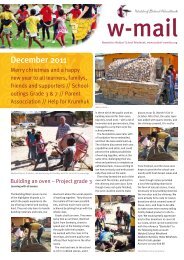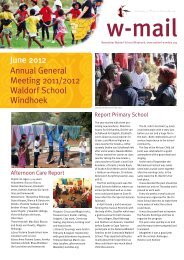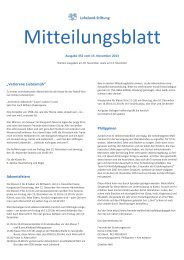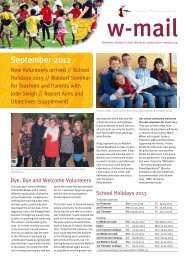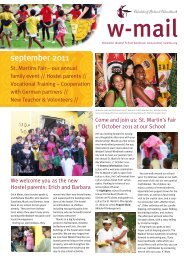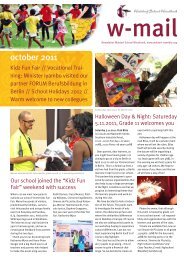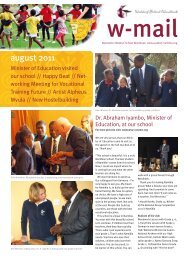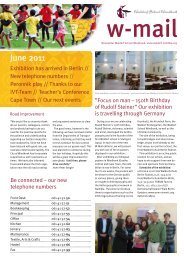Create successful ePaper yourself
Turn your PDF publications into a flip-book with our unique Google optimized e-Paper software.
w-mail<br />
Newsletter <strong>Waldorf</strong> <strong>School</strong> <strong>Windhoek</strong>, www.waldorf-namibia.org<br />
<strong>March</strong> <strong>2012</strong><br />
NSSC Results // Grade 3 renovated<br />
their Classroom // Rudolf<br />
Steiner – Founder of <strong>Waldorf</strong> Education<br />
// Why <strong>Waldorf</strong> Education<br />
works // Welcome new Colleagues<br />
NSSC Results 2011<br />
We are very happy to announce<br />
that this year all learner of grade 13<br />
passed their NSSC exams. To be<br />
sucessful in examinations it is very<br />
important to understand where a<br />
learner is really standing academically<br />
to enter her/him at an appropriate<br />
level. It is not our aim to push<br />
all learners to the highest mark on<br />
the scale but the highest mark they<br />
can achieve. The waldorf curriculum<br />
also enables learners to reach<br />
Renovated classroom<br />
NSSC examination that would not<br />
have been allowed to continue in<br />
another school. Therefore a 3 or C<br />
may be quite an achievement for<br />
someone that comes from a background<br />
that didn’t support education<br />
in the best manner.<br />
We are especially proud of our<br />
DAF learners where we had 3 A+.<br />
The complete examination results<br />
will be displayed in the front office.<br />
Simone de Picciotto<br />
Thanks a lot to all grade 3 parents for your big help.<br />
Learners and parents join hands<br />
to renovate their classroom<br />
Before the grade 3 learners came<br />
back to school after the summer<br />
holidays, their teacher, Erich<br />
Kunderer – with the support of<br />
Elias and Ricardo – renovated their<br />
classroom. The roof beams are<br />
now white; there is a new carpet<br />
(financed with the help of the<br />
parents) and some new furniture<br />
(built by Erich Kunderer himself),<br />
such as a storage cupboard, a<br />
“4-seasons cupboard”, and a<br />
clothes rack, which are the main<br />
features of the classroom. The<br />
learners helped diligently with the<br />
sanding of the wood.<br />
Another activity which the children<br />
tackled with much joy and<br />
commitment was the renovation of<br />
their tables and chairs. Elias and<br />
Erich repaired them where as the<br />
learners sanded and oiled them<br />
during the lessons. The parents<br />
also joined in on two Saturdays,<br />
grinding, oiling and painting.<br />
Erich Kunderer remarked with joy:<br />
“Since the children are back in<br />
their classroom, they handle the<br />
furniture much better than before!”<br />
Erich Kunderer, Classteacher grade 3<br />
The grade 3 curriculum of <strong>Waldorf</strong><br />
pedagogy is all about the creation<br />
of the world (Genesis). This age<br />
group deals with the crafts such as<br />
farming, building and baking. The<br />
children learn to create their own<br />
world. In the developmental phase<br />
of children from grades 3–5, the<br />
teaching methods are most effective<br />
by active participation and<br />
stimulating the senses of the<br />
child. This is different in grades 1<br />
and 2, when the children learn by<br />
imitation and repetition, in that<br />
now they have reached a new<br />
phase of observation, where they<br />
ask questions and start working<br />
independently.<br />
Katharina Wyss
Happy Birthday Rudolf Steiner,<br />
founder of <strong>Waldorf</strong> Education<br />
27 February 1861 – 30 <strong>March</strong> 1925<br />
“My meeting with Rudolf Steiner led me to<br />
occupy myself with him from that time forth<br />
and to remain always aware of his significance.<br />
We both felt the same obligation to lead man<br />
once again to true inner culture. I have rejoiced<br />
at the achievements his great personality and<br />
his profound humanity have brought about in<br />
the world.” Albert Schweitzer<br />
One morning at our schoolground: Classteacher Nawala Weber-Trianus and grade 2<br />
are practizing fluet during their mainlesson<br />
Why <strong>Waldorf</strong> is so attractive<br />
Philadelphia <strong>School</strong> Goes “Unplugged“<br />
Want to know a secret? Some of<br />
the tech world‘s biggest gurus are<br />
sending their own kids to schools<br />
with no computers. They‘re called<br />
<strong>Waldorf</strong> <strong>School</strong>s, and they are<br />
unplugged on purpose. Karen Hepp<br />
visited a <strong>Waldorf</strong> in our area where<br />
they think children should explore<br />
without a tablet in their hands.<br />
Philadelphia‘s <strong>Waldorf</strong> school is in<br />
Mount Airy, the philosophy isn‘t<br />
just low tech, it‘s no tech no computers,<br />
no batteries, nothing that<br />
beeps – it‘s totally unplugged. One<br />
of the most obvious differences<br />
toys, no electronics, no beeps, felt,<br />
real wood, pinecones, nature table,<br />
play station, marble roll, balance<br />
beam, arrange furniture hang out<br />
in. The absence of media, not even<br />
technology kids are relentlessly<br />
marketed to from the time born,<br />
supermarket, movies on yogurt,<br />
this school had none of that.<br />
The <strong>Waldorf</strong> philosophy is to<br />
let the natural world be the playground<br />
to explore and create and<br />
imagine put the good stuff in get<br />
the good stuff out literally. <strong>Waldorf</strong><br />
is becoming especially popular in<br />
tech savvy communities. The parents<br />
aren‘t haters, they just think<br />
young children learn best without<br />
all the bells and whistles. (published<br />
3.2.<strong>2012</strong> Philadelphia News:<br />
http://www.myfoxphilly.com)<br />
Beginning at the end of the 19th<br />
century, a relatively unknown<br />
Austrian philosopher and teacher<br />
began to sow the seeds of what he<br />
hoped would blossom into a new<br />
culture. The seeds were his ideas,<br />
which he sowed through extensive<br />
writings, lectures and countless<br />
private consultations. The seeds<br />
germinated and took root in the<br />
hearts and minds of his students,<br />
among whom were individuals who<br />
would later become some of the<br />
best known and most influential<br />
figures of the 20th century. Since<br />
the teacher‘s death in 1925, a quiet<br />
but steadily growing movement,<br />
unknown and unseen by most<br />
people, has been spreading over<br />
the world, bringing practical solutions<br />
to the problems of our global,<br />
technological civilisation. The<br />
seeds are now coming to flower in<br />
the form of thousands of projects<br />
infused with human values. The<br />
teacher, called by some “the best<br />
kept secret of the 20th century”,<br />
was Rudolf Steiner.<br />
Steiner, a truly “Renaissance<br />
man”, developed a way of thinking<br />
that he applied to different aspects<br />
of what it means to be human. Over<br />
a period of 40 years, he formulated<br />
and taught a path of inner<br />
development or spiritual research<br />
he called, “anthroposophy”. From<br />
what he learned, he gave practical<br />
indications for nearly every field<br />
of human endeavour. Art, architecture,<br />
drama, science, education,<br />
agriculture, medicine, economics,<br />
religion, care of the dying, social<br />
organisation - there is almost no<br />
field he did not touch.<br />
Today, wherever there is a human<br />
need you‘ll find groups of people<br />
working out of Steiner‘s ideas. There<br />
are an estimated ten thousand<br />
<strong>Waldorf</strong> <strong>School</strong> Uhlandshöhe in Stuttgart,<br />
founded in 1919. Since that time more than<br />
1000 schools worldwide are established.<br />
initiatives worldwide – the movement<br />
is a hotbed of entrepreneurial<br />
activity, social and political activism,<br />
artistic expression, scientific<br />
research, and community building.<br />
Contemporary manifestations of<br />
Steiner‘s influence include <strong>Waldorf</strong><br />
Education, Biodynamic farming and<br />
gardening, and the Camphill Movement<br />
for the support of people with<br />
disabilities.<br />
© www.whywaldorfworks.org<br />
The workforce of the <strong>Waldorf</strong> Astoria<br />
cigarette factory with Emil Molt<br />
(arrow) in Stuttgart, arround 1920.<br />
The Molt couple; founders of the<br />
<strong>Waldorf</strong> foundation.<br />
Grade 4 (2011)
World Hunger and Food<br />
Das Soziale Hauptgesetz<br />
“No one with an open mind will maintain that<br />
we should blame Nature for the appalling state<br />
the world is in. The cause is to be found in<br />
the way humans use what Nature gives them. It<br />
lies in the way people relate to each other. And<br />
this relationsship, of course, emanates from<br />
the way people feel. Ultimately, the way people<br />
work for each other will depend on how they<br />
experience the world in the depths of their<br />
soul.“<br />
Fundamental Social Law<br />
”The well-being of a community working together will be greater,<br />
the less the individual claims the proceeds of his work for<br />
himself, i.e. the more of these proceeds he hands over to his<br />
fellow-workers, and the more his own needs are satisfied, not out<br />
of his own work but out of the work done by others. Every arrangement<br />
in a community that is contrary to this law will inevitably<br />
engender distress and want somewhere.“ Rudolf Steiner, Berlin 1917<br />
Das Soziale Hauptgesetz<br />
„Das Heil einer Gesamtheit von zusammen arbeitenden Menschen<br />
ist um so grösser, je weniger der Einzelne die Erträgnisse seiner<br />
Leistungen für sich beansprucht, das heisst, je mehr er von<br />
diesen Erträgnissen an seine Mitarbeiter abgibt, und je mehr<br />
seine eigenen Bedürfnisse nicht aus seinen Leistungen, sondern<br />
aus den Leistungen der anderen befriedigt werden.<br />
Alle Einrichtungen innerhalb einer Gesamtheit von Menschen,<br />
welche diesem Gesetz widersprechen, müssen bei längerer Dauer<br />
irgendwo Elend und Not erzeugen.“ Rudolf Steiner, Berlin 1917<br />
This fundamental law applies to social life with a validitiy and<br />
necessity more absolute than any law of nature.<br />
“It is clear that this law states nothing less than: human wellbeing<br />
is inversely proportional to egotism. To work for oneself is inevitably<br />
to fall prey to egotism. Only through working for others can<br />
one gradually become an unegotistic worker.”<br />
Rudolf Steiner, Berlin/Dornach 1917<br />
We labour nowadays under the unconscious assumption – originating with Adam Smith – that<br />
SELF INTEREST, as the basis of all human well-being, is a fixed law of nature. The “general<br />
wellbeing“ this results in, as can be seen on all sides today, is restricted to ever smaller groups<br />
of people, until of necessity it will apply only to individuals. That only in this way do we CAUSE<br />
hunger and poverty is something that we will not understand until we learn to perceive our<br />
own contribution to them. This is the hard lesson of Rudolf Steiner‘s fundamental social law.<br />
Design: Katharina Wyss<br />
Travelling Exhibition “Focus on man – Rudolf Steiner and Anthroposophy in Namibia“, Poster 6 > For more information visit our blog (in german language) www.wsw-connect.de
The Magic Flute, 23.3.<br />
Friday, 23 <strong>March</strong> <strong>2012</strong>, 19:00<br />
The story and selected songs from The Magic<br />
Flute by Wolfgang Amadeus Mozart performed<br />
by grade 7.<br />
Artistic director: Barbara Stauffer, Erich Meier<br />
Venue: <strong>Waldorf</strong> <strong>School</strong> <strong>Windhoek</strong><br />
Ute Mehnert<br />
Dear school community, most of you will know<br />
me, but for those of you who don‘t I quickly<br />
want to introduce myself here. My name is Ute<br />
Mehnert, I am married to Marc who teaches<br />
German and Drama in High <strong>School</strong> and is class<br />
guardian. Our daughter Friedja is now grade 8,<br />
our son Bentje attends grade 7. Before we came<br />
to Namibia I had been working at a <strong>Waldorf</strong><br />
<strong>School</strong> in Northern Germany for more than ten<br />
years. We came to Namibia three and a half<br />
years ago looking for new challenges and<br />
willing to learn and grow as human beings. And<br />
challenges in almost every area of life we did<br />
face ... After having taken last year off teaching<br />
in order to work in different areas, I am now<br />
back preparing our grade 13 students for their<br />
NSSC in English. Another challenge that I am<br />
looking forward to. See you around at school<br />
events!<br />
Alpheus Mvuala<br />
Good day to you all. I am the new art teacher<br />
for grade 8 and 9. I like art and as a professional<br />
artist, I focus a lot on sculpturing in marble<br />
and in granite. I’ve exhibited internationally<br />
before, and won the Bank <strong>Windhoek</strong> Triennale<br />
Award. Currently, my public sculpture is installed<br />
at the National Art Gallery of Namibia as<br />
permanent collection. I am the only artist in the<br />
house project (of the NAGN) and coordinator<br />
of “Art Talk“. My artwork are displayed at my<br />
studio at Soweto, in Claudia Kandovazu Str.<br />
9215. Art is my thing. I appreciate to be here.<br />
Chicken for sale<br />
We have view chicken for sale from our school<br />
ground again. Please don‘t hesitate to contact<br />
Elias 081 233 10 90.<br />
Contact to our W-Mail-Team: Katharina Wyss,<br />
wyss@waldorf-namibia.org · Photos: K. Wyss, E. Meier<br />
Hit the Beat – Choir and<br />
Friends on Facebook<br />
Simone de Picciotto and 65 learners from grade<br />
10, 11 and 12 will fly in June for two weeks to<br />
Germany. The entire High <strong>School</strong> Choir and<br />
drumming group are working hard every week<br />
to be perfect prepared for their shows with<br />
drumming, singing and traditional dancing too.<br />
Be up to date and visit our<br />
> facebook.com/hitthebeatconcert<br />
Events <strong>March</strong> <strong>2012</strong><br />
Midtermbreak<br />
5–9 <strong>March</strong> <strong>2012</strong><br />
Parents Evening Grade 4<br />
Mon 12 <strong>March</strong> <strong>2012</strong>, 19:00<br />
Parents Evening Grade 7<br />
Mon 19 <strong>March</strong> <strong>2012</strong>, 19:00<br />
Independent Day<br />
Wed 21 <strong>March</strong> <strong>2012</strong><br />
The Magic Flute (Event)<br />
Fri 23 <strong>March</strong> <strong>2012</strong>, 19:00, Hall<br />
Green Market Café<br />
Sat 24 <strong>March</strong> <strong>2012</strong>, Grade 9<br />
Trimester Festival + Open Day<br />
Sat 31 <strong>March</strong> <strong>2012</strong><br />
Andreas Fellner<br />
Hello Everybody! I am delighted to be back at<br />
school. We are fortunately that we are able to<br />
work together, and this year, I will be able to<br />
do teachers training, on-the-job training and<br />
also possibly provide support to the staff of<br />
the <strong>Waldorf</strong> <strong>School</strong>. I am also accompanying<br />
Mr. Junius as the class guardian of grade 8 and<br />
helping with advice for the year projects. So it<br />
is my pleasure to inform you that I am available<br />
to answer any questions you may have about<br />
<strong>Waldorf</strong> schools and the pedagogical or educational<br />
principles of the school – just let me<br />
know if you have any queries.<br />
Donations Baking Trays<br />
For the future regulary weekly use of our baking<br />
oven we urgently looking for donations such<br />
as: baking trays, “Gugelhupfformen“ and<br />
wood (big or small). We intend to have a regular<br />
weekly baking day, open for all parents.<br />
Keep in Contact:<br />
<strong>Waldorf</strong> <strong>School</strong> <strong>Windhoek</strong><br />
P.O. Box 90326, <strong>Windhoek</strong>, Namibia<br />
Andries de Wet Street/Avis<br />
Tel. +264 (0)61 41 52-50, Fax +264 (0)61 41 52-99<br />
office@waldorf-namibia.org<br />
Web: www.waldorf-namibia.org<br />
Blog: www.wsw-connect.org<br />
Namibia<br />
<strong>Waldorf</strong> <strong>School</strong> <strong>Windhoek</strong><br />
Nedbank Namibia, Hidas <strong>Windhoek</strong><br />
Branch-Code 461696, Account: 110 000 826 88<br />
IBAN: 46 16 96 11 00 00 82 688<br />
BIC (Swift-Code): NEDS NANX<br />
Germany<br />
Freunde der Erziehungskunst, GLS Bank<br />
Account: 130 420 10, BLZ 430 609 67<br />
VWZ: 4886 WSW Namibia + Spenderadresse<br />
Die Angabe Ihrer Anschrift im Feld Verwendungszweck ermöglicht<br />
das Ausstellen der Spendenbescheinigung.<br />
Switzerland<br />
Freie Gemeinschaftsbank BCL<br />
Account: EK 115.5<br />
Postcheck der Bank: Basel 40-963-0<br />
Kennwort: WSW Namibia<br />
Netherlands<br />
Triodos Bank NV, Zeist, Account: 21.22.68.872<br />
Kennwort: WSW Namibia



